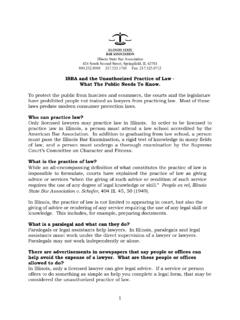Transcription of Serving as a Guardian for an Adult with Disabilities
1 Consumer Legal GuideServing as a Guardian for an Adult with DisabilitiesILLINOIS STATEBAR ASSOCIATIONASK A LAWYERSERVING AS A Guardian FOR AN Adult WITH DISABILITIESS erving as a Guardian for a disabled Adult age 18 and older is a serious responsibility. As Guardian , you have been given control over certain or all aspects of the person s life. At all times, you must follow the law, the guardianship order, and any other specific court orders pertaining to your Guardian -ship. You must act in the ward s best inter-ests and avoid any conflict of interest or ap-pearance of impropriety when handling the ward s affairs. You are also expected to seek out and rely upon professional financial and legal assistance, when TERMINOLOGYC ertain terms have specific meanings when used in relation to guardians and guardianships: A disabled person is a person 18 years or older who is not fully able to manage his or her person or estate because of mental deterioration, physical incapac-ity, a mental illness, a developmental disability, a gambling or drug addic-tion, or fetal alcohol syndrome.
2 A ward is the person who has been declared by the court to be disabled and the person for whom you have been appointed as Guardian . A Guardian ad Litem is a person, typically an attorney, who has been ap-pointed by the court to look out for the ward s best interests. A guardianship order means the court order setting forth your powers and duties as the Guardian . Letters of Office are court documents which confirm your appointment as Guardian ; you should retain the origi-nals in a safe OF GUARDIANSHIPD ifferent types of guardianships have dif-ferent types of duties and duration. Your powers as Guardian will depend on the kind of guardianship which the court has estab-lished for your ward.
3 Guardianship of the estate means that the Guardian will be responsible for all financial and legal matters of the ward. Guardianship of the person means that the Guardian will be responsible for all of the ward s personal care mat-ters, including healthcare and residen-tial placement. Plenary guardianship, which can ap-ply to a guardianship of the estate, of the person, or both, means that the Guardian will have all of the powers and duties which are customarily granted to a Guardian under Illinois law. Limited guardianship, which can ap-ply to both a guardianship of the es-tate, of the person, or both, means the Guardian will have only certain limited powers determined in the Court Order appointing the Guardian .
4 Temporary guardianship, which can apply to both a guardianship of the es-tate, of the person, or both, means that the Guardian will be appointed in an emergency situation, such as the death of an existing Guardian or before a per-manent Guardian can be appointed by the court, where a temporary guard-ianship is necessary for the immediate welfare and protection of the ward; a temporary guardianship only lasts for up to 60 days, although it can be ex-tended by the court under certain cir-cumstances. Successor guardianship, which can apply to both a guardianship of the estate, of the person, or both, means that a replacement Guardian will be appointed upon the death, incapacity, resignation, or removal of the existing Guardian of a living ward.
5 Testamentary guardianship, which can apply to both a guardianship of the estate, of the person, or both, means that the Guardian will be designated by a parent of a disabled person in his or her will to be appointed as Guardian upon the parent s death. BASIC DUTIES OF A Guardian OF THE PERSONAs Guardian of the person, you will have certain basic duties under the law: You will be responsible for the personal and medical care of the ward and may have the actual physical custody of the ward, the ward s minor children, and any Adult children who are dependent on the ward for support and care. You will need to make decisions for the ward relating to personal care, health-care, and living arrangements to the ex-tent specified in the guardianship order.
6 You may need to file written reports to the court describing the ward s current condition, living arrangements, typical activities, and a summary of your con-tact with the ward. You should check with the probate judge or an attorney to determine how frequently your court requires you to ON THE Guardian OF THE PERSONT here are certain things that the Guardian cannot do without specific permission from the court. A specific court order is required before you can place the ward in a residen-tial facility such as a nursing home and be-fore you consent to a sterilization procedure. A court may authorize the Guardian to peti-tion for divorce on behalf of his or her ward if the court finds it is in the ward s best in-terest; it may also authorize the Guardian to consent to the ward s marriage if it finds it is in the ward s best interest.
7 A Guardian can-not admit a ward to a mental health facility unless the ward requests the Guardian do so and has the required capacity to make such a DUTIES OF A Guardian OF THE ESTATEAs Guardian of the ward s estate, you will need to manage the property, finances, and legal affairs of the ward. At a minimum, you will be required to: file an inventory of the ward s assets and income with the court within 60 days of the issuance of your Letters of Office; keep the ward s assets and income to-tally separate from your own assets and property; open an estate checking account, with your name as Guardian , for the receipt of the ward s regular income and for you to use for payment of the ward s bills; arrange to have the ward s bills, bank statements, and other important mail sent directly to you; however, the ward should continue to receive his or her own personal mail.
8 Pay the ward s bills in a timely manner, using the ward s funds and income; contact all sources of the ward s in-come, such as the Social Security Ad-ministration, Department of Veterans Affairs and/or any pensions or employ-ers and request that the ward s checks be sent to you or the estate checking ac-count; be sure that the ward s real estate and other assets are securely protected and maintained, and restrict access to the property and accounts as determined to be in the ward s best interests; prudently manage and invest the ward s financial resources; prudently maintain the ward s real estate, which includes keeping it safe and insured; safeguard the ward s personal property and maintain insurance coverage if ap-propriate; apply the ward s assets to the comfort, care and education of the ward and any of his or her dependents; respond to any legal matters concern-ing the ward and be sure that he or she is represented in any court proceed-ings; pay the ward s taxes; apply for available public benefits and resources for the ward.
9 File a written account of all financial transactions which you make on behalf of the ward setting forth all income re-ceived and expenditures made on be-half of the ward. Illinois law provides that an accounting must be provided to the court one year after your appointment as Guardian and every three years thereafter. Some courts require the account to be filed on an annual basis; you should check with an attorney to see how frequently accounts are required in your area. You also should find out whether it is necessary to schedule a court hearing for ap-proval of the account. In counties where the Guardian ad litem remains involved in the case, you should provide him or her with a copy of the ON THE Guardian OF THE ESTATEAs Guardian of the estate, there are cer-tain things that you cannot do without spe-cific permission from the court.
10 You will need to file a petition with the court, and probably notify the Guardian ad litem be-fore doing any of the following: transfer or sell any of the ward s per-sonal property or real estate; mortgage the ward s real estate or take out any other loans on the ward s be-half; make any gifts from the ward s estate, even if the ward gives you permission; expend any large sums of the ward s money for unusual or extraordinary ex-penses, such as the purchase of a new home or automobile; or distribute any money to yourself or anyone else for Guardian THE RESPONSIBILITIES OF THE GUARDIANOnce a Guardian is appointed, only the court can terminate or modify the terms of the guardianship.










